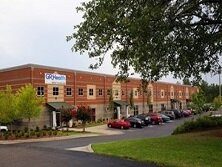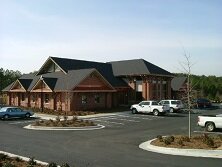Motility Clinic
The Area's Only Motility Clinic and Neurogastroenterologist
Many digestive disorders are caused by disruptions in the spontaneous way in which food moves through a person’s digestive tract in a process known as gastric motility. This generally occurs through rhythmic muscle contractions. When the nerves and muscles do not work properly to cause these contractions, or there is a problem between how the gut and brain communicate, the normal digestive process is disrupted, causing digestive problems.
Highly trained subspecialists, known as neurogastroenterologists, or motility specialists, have the knowledge and skills to diagnose and treat motility disorders.
Georgia Regents Medical Center staffs a globally renowned neurogastroenterologist who directs the area’s only motility clinic. The clinic is one of only 10 facilities in the nation to be designated a “Center of Excellence” by the American Neurogastroenterology and Motility Society.
The clinic offers a variety of advanced diagnostic tests and treatments for various areas of the digestive tract, including:
- The esophagus, to diagnose and treat heartburn, swallowing disorders, and other problems
- The stomach, to diagnosis and treat gastroparesis, or delayed gastric emptying, and abdominal pain or discomfort
- The small intestine, to find the cause of and treat irritable bowel syndrome (IBS), bacterial overgrowth or gas and bloating
- The large intestine or colon, to identify the cause of and treat constipation, diarrhea, IBS or other disorders
- The pelvic floor and rectum, to find and treat the cause of fecal incontinence, difficulty with bowel movements (dyssynergic defecation) or anorectal pain
Request an online appointment now or call 706-721-9522 to speak to a member of our Care Team.
Lactose-Fructose Intolerance Clinic
Many people suffer from bloating and gas because their bodies cannot efficiently digest or absorb some common food items such as lactose, or milk sugar. Other people suffer similar symptoms because their bodies cannot digest fructose, a type of sugar found in fruits and some vegetables, or they have difficulty digesting carbohydrates such as fructan.
Unfortunately, these disorders are frequently undiagnosed or misdiagnosed.
If you suffer from unexplained gas and bloating, the trained staff at our Lactose and Fructose Intolerance Clinic can help. The team includes gastroenterologists, specially trained registered nurses and registered dieticians who understand these disorders and offer effective solutions to help you maintain your nutritional status and avoid unpleasant symptoms.
We’ll begin with a comprehensive evaluation that may include:
- A Hydrogen Breath Test for lactose intolerance
- A Breath Test for fructose intolerance
Pelvic Floor Clinic
A Pelvic Floor Disorders Clinic for Incontinence, Constipation and Other Problems
The term pelvic floor disorders is used to describe a wide range of problems that occur due to weakness, injury or dysfunction of the nerves, muscles, ligaments or connective tissue in the pelvis. This allows the bladder, urethra, small intestine, rectum, uterus or vagina to drop, become weak or malfunction. As a result, patients may experience embarrassing problems such as urinary or fecal incontinence, anorectal pain or dyssynergic defecation, which leads to chronic constipation.
But the specialists at our Pelvic Floor Disorders Clinic have the skills and technology to diagnose the problem and design a plan of care just for you.
The clinic offers:
- A multidisciplinary team that includes gastroenterologists, urologists, urogynecologists, colorectal surgeons, radiologists and psychologists
- Registered dieticians
- The latest diagnostic tests and treatment protocols
- Care, medical management and surgery for fecal and urinary incontinence, dyssynergic defection, anorectal pain and other pelvic floor disorders
- Advanced therapies such as biofeedback, in which specialists teach patients how to coordinate the use of their abdominal and pelvic floor muscles to improve bowel function
- Cognitive behavioral therapy
- Bowel control management
- Sacral nerve stimulation for bladder control
- Diagnosis and management of urinary incontinence, in conjunction with urologists and urogynecologists
You don’t have to live with incontinence and other pelvic floor disorders.
Request an online appointment now or call 706-721-9522 to speak to a member of our Care Team.
Dysphagia Clinic
Innovative Care for Swallowing Disorders at our State-of-the-art Dysphagia Clinic
Dysphagia, or difficulty swallowing, makes it hard for many people to get the nourishment they need. The condition can be caused by a number of factors, but it is more common in older adults.
The staff at our multidisciplinary Dysphagia Clinic will identify the cause of your problems and design a customized treatment plan for you.
The clinic offers:
- A multidisciplinary team of physicians that includes gastroenterologists, otolaryngologists and gastrointestinal and thoracic surgeons who offer comprehensive diagnosis and care for swallowing disorders
- A broad range of diagnostic tests, including high resolution and high definition 3-D manometry, impedance manometry and 24 and 48 hours pH studies to identify the underlying cause of your problem
- Tests for non-cardiac chest pain, such as esophageal balloon distention test
- Esophagrams, or contrast x-rays of the esophagus
In addition, we offer a full range of medical and surgical care, including:
- Medications and medical management
- Nutritional support from registered dieticians
- Botulinum Toxin injections to relax muscles in the esophagus
- Swallowing therapy
- Endoscopic balloon dilation, to gently stretch and expand the esophagus
- Laparoscopic and other surgeries
- Feeding tubes
Don’t let swallowing problems undermine your health. Request an online appointment now or call 706-721-9522 to arrange a quick, convenient appointment.





